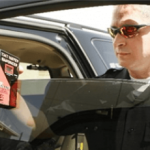OPINION
PER CURIAM.
Following a bench trial, claimants, Eugene Davidson III ("Davidson") and Kathy Davidson, appeal by right the trial court's order granting the prosecutor's petition for forfeiture of $ 167,200 in currency pursuant to MCL 333.7521(1)(f). We affirm.
Davidson first argues that the trial court erred in denying his motion to suppress certain evidence found during a warrantless search. Before the instant forfeiture proceedings, Davidson was charged with and convicted of felonious assault, MCL 750.82, and possession of less than 25 grams of heroin, MCL 333.7403(2)(a)(v). Initially, we note that we have rejected Davidson's argument in his appeal of his criminal convictions. People v Davidson, unpublished opinion per curiam of the Court of Appeals, decided September , 2006 (Docket No. 263013). During a forfeiture proceeding, the trial court may not determine anew the validity of the seizure of the evidence that has already been suppressed in a criminal proceeding. In re Forfeiture of United States Currency, 166 Mich. App. 81, 90-91; 420 N.W.2d 131 (1988). Likewise, principles of collaterally estoppel will generally preclude revisiting the validity of a search that has been upheld by a final judgment in a prior related criminal proceeding. In re Forfeiture of $ 1,159,420, 194 Mich. App. 134, 145-146; 486 N.W.2d 326 (1992) (noting that "[c]rossover estoppel involves issue preclusion in a civil proceeding following a criminal proceeding and vice versa.") Here, the trial court could not reconsider its ruling regarding whether the recovery of the currency and the evidence found inside the Toyota violated Davidson's constitutional rights. Moreover, the record below in the instant case is devoid of any reference to the suppression hearing. Accordingly, we decline to address this issue on appeal.
Davidson next argues that the trial court erred in concluding that petitioner presented sufficient evidence to prove by a preponderance of the evidence a substantial connection between the currency seized and drug trafficking. Davidson contends that the trial court erred in failing to grant his motion for directed verdict and in ordering the money forfeited. We disagree.
This Court reviews de novo the trial court's decision on a motion for a directed verdict. Tobin v Providence Hosp, 244 Mich. App. 626, 642; 624 N.W.2d 548 (2001). "To evaluate a motion for a directed verdict, a court considers the evidence in a light most favorable to the nonmoving party, making all reasonable inferences in favor of the nonmoving party." In re Forfeiture of $ 25,505, 220 Mich. App. 572, 574-575; 560 N.W.2d 341 (1996). With respect to the lower court's judgment, we review the trial court's findings of fact for clear error, recognizing the special opportunity of the trial court to determine credibility. MCR 2.613(C); In re Forfeiture of $ 18,000, 189 Mich. App. 1, 4-5; 471 N.W.2d 628 (1991).
In Michigan, a forfeiture proceeding is an in rem civil proceeding, and the government has the burden of proving its case by a preponderance of the evidence. In re Forfeiture of $ 25,505, supra at 574. Pursuant to MCL 333.7521(1)(f), anything that can be traced to an exchange for a controlled substance is subject to forfeiture. Id. "In order for an asset to be ordered forfeited, the trial court must find that there is a substantial connection between that asset and the underlying criminal activity." In re Forfeiture of $ 1,159,420, supra at 146. If the asset has only an incidental or fortuitous connection to the criminal activity, forfeiture is not warranted. Id. However, the connection between the currency and the criminal activity does not have to be related to a specific instance of drug dealing; rather, the currency need only be traceable to drug trafficking in general. Id. at 147.
We conclude that the trial court did not clearly err by determining that the government presented sufficient evidence to prove by a preponderance of the evidence a substantial connection between the money and drug trafficking. First, the entire amount was in "large bills" that were bundled together with rubber bands in "large" stacks. Each stack of bills was kept inside a shoebox located inside a dresser in Davidson's bedroom. A random sampling of the currency was hidden and a police dog located it by smelling narcotics on the bills.
Further, Officer Terry Vesco testified that the 24 individual lottery ticket strips found in Davidson's vehicle parked outside the residence were "indicative of sales rather than personal use" and that it was "common" for a narcotic trafficker to keep the heroin and the money in a separate location. The evidence also showed that Davidson was not found in possession of a "heroin works kit," which is commonly used by heroin users for personal consumption. Officer Patrick Connor testified that, based on his training and experience, the items were likely "paraphernalia for packaging narcotics." An investigation by Vesco following Davidson's arrest revealed that he was the subject of an "ongoing" narcotics investigation in Detroit. Further, the trial court noted Davidson had five prior drug convictions, one of which involved drug trafficking. Davidson also testified that he had used and sold narcotics from 1984 to 1995.
Finally, the lack of evidence that the money came from a legitimate source supported the conclusion that it was proceeds from drug transactions. The evidence at trial indicated that Davidson's net income never exceeded $ 31, 145 a year from his employment with the city of Detroit Forestry Department and he had approximately $ 1,860 in his personal bank account at the time of his arrest. On the appointment of counsel request form in the underlying criminal case, Davidson indicated that he had "$ 0" income. Furthermore, the evidence showed that Davidson incurred various liabilities within the three years preceding his trial, including a federal lien in the amount of $ 179,100, two residential loans each in excess of $ 100,000 and at least three forfeiture judgments totaling in excess of $ 300,000.
Moreover, Davidson's testimony did not conclusively establish when or from what source the money was derived. Indeed, he indicated to the officers during the seizure of the money that it came from his side business, All Around Tree Service, but later testified that it also came from a 1990 inheritance, gambling and other sources. As the trial court noted, Davidson's explanation was not credible. "Questions of credibility are left to the trier of fact and will not be resolved anew by this Court." People v Avant, 235 Mich. App. 499, 506; 597 N.W.2d 864 (1999). Therefore, we conclude that the trial court did not clearly err in finding by the preponderance of the evidence a substantial connection between the money and drug trafficking. In re Forfeiture of $ 1,159,420, supra at 146-147. Accordingly, viewing the foregoing evidence in a light most favorable to petitioner, the trial court properly denied claimants' motion for a directed verdict. In re Forfeiture of $ 25,505, supra at 574-575.
We affirm.
/s/ Mark J. Cavanagh
/s/ Jane E. Markey
/s/ Patrick M. Meter





